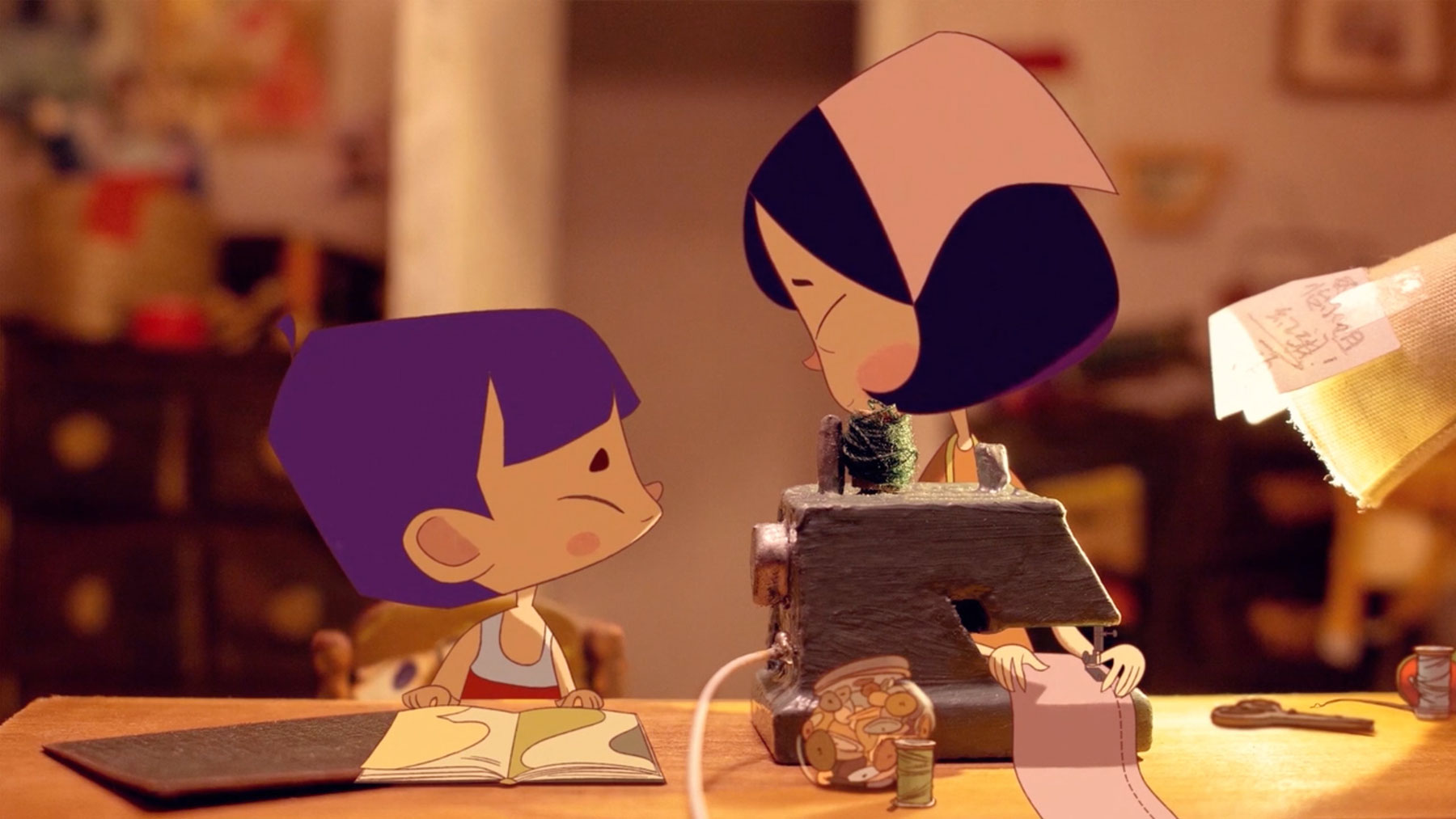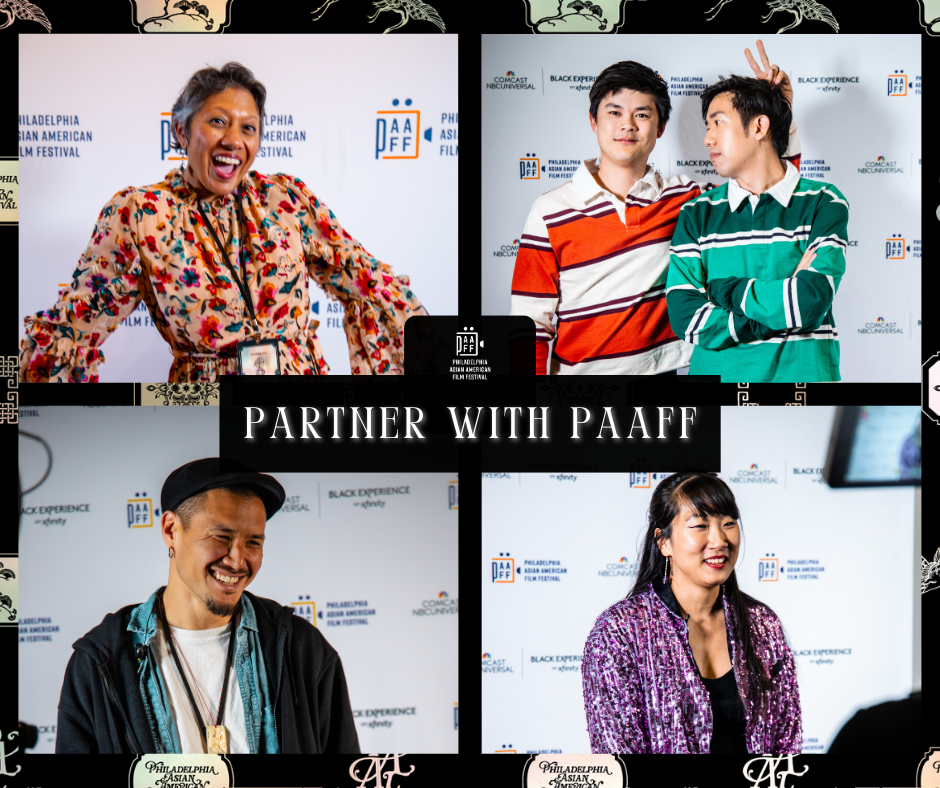The experiences of childhood and youth unfold in small moments. This collection of animated shorts in our program Small Moments, reflect the tense & tender, lonely & liberating, and embarrassing & empowering moments that shape our intimate selves and family relationships.
Some of the filmmakers from this program chatted with us about their films, their artistic roots, and their dreams.
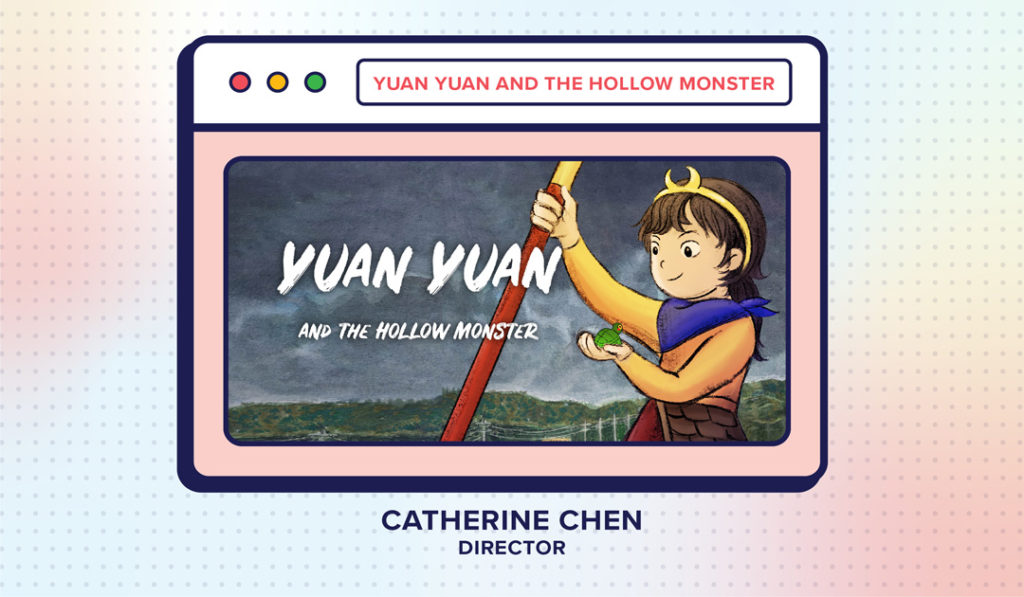
Yuan Yuan and the Hollow Monster
Director: Catherine Chen
Without spoiling anything, describe your film in 7 words or less.
C. Chen: childhood, turtle, hurricane, redemption, surreal, heroic, cute
Do you have a favorite memory from making this film? Were there any challenges that you had to overcome?
C. Chen: My favorite part is working on this with my close team, especially towards Post-Production when it became more collaborative.
I met with my sound designer Alesia Williams and composers Aki Cao and Emiliano Mazzenga for months during post-production. We didn’t have the equipment necessary for the best work due to quarantine, but that didn’t faze us! The challenge was that I was trying to learn storytelling while making the film. So I spent most of my time in pre-production— storyboarding, writing, and development. I was adamant about getting better at it and as a result, production was squeezed into 4 months. I was able to complete the film because my team did a lot of the heavy lifting. During production, my animator Yuyuan Chen helped animate eight character acting shots, despite all of her class assignments. My mom, Donghui Shi learned watercolor painting specifically to help create the foundation for many backgrounds I needed and even recruited help from her friends. My sister Rosaline Chen, who was 9 at the time, voiced the main character and brought along her friend Raina as well. And a shout out to right-hand man, editor Diego Yanez, who spent tens of hours every week to make this project happen. That is 10 months of the entire year! Put simply, this film would not be complete without him.
What do you hope to see in the future for the film industry? How do you see yourself and your work playing a role in this future?
C. Chen: I hope to see the film industry completely changed, where people of every race and ethnicity are satisfied with their representation on screen. An industry like this would create an educated populace and humbling culture… where one day, our voice is no longer limited by our skin.
Before this, I wanted to be one of the forerunners of Chinese American representation and voices in the entertainment industry. But I am not. And I see that many other minority Americans (Asian, Black, Hispanic, etc) have paved the way before me. Because of that, I can create freely by being myself, finding my voice, and not be limited by what is “Asian American”.
I recognize that I am already standing on the shoulders of giants. But I will continue to push mainstream culture into a more inclusive direction. I will keep creating animation and stories that are authentic to me. By honing on my craft and uncovering my voice, I hope to break stereotypes and show that Asian Americans are not limited in the kind of stories that we tell.
What’s next for you?
C. Chen: I’m trying to make it as a writer for film and animation. I specialize in writing surreal family stories focused on children. That has been my focus. I’m also storyboarding a new 1-minute short film segment for the Yuan Yuan brand. The goal is to make it better than Yuan Yuan and the Hollow Monster in every way possible.
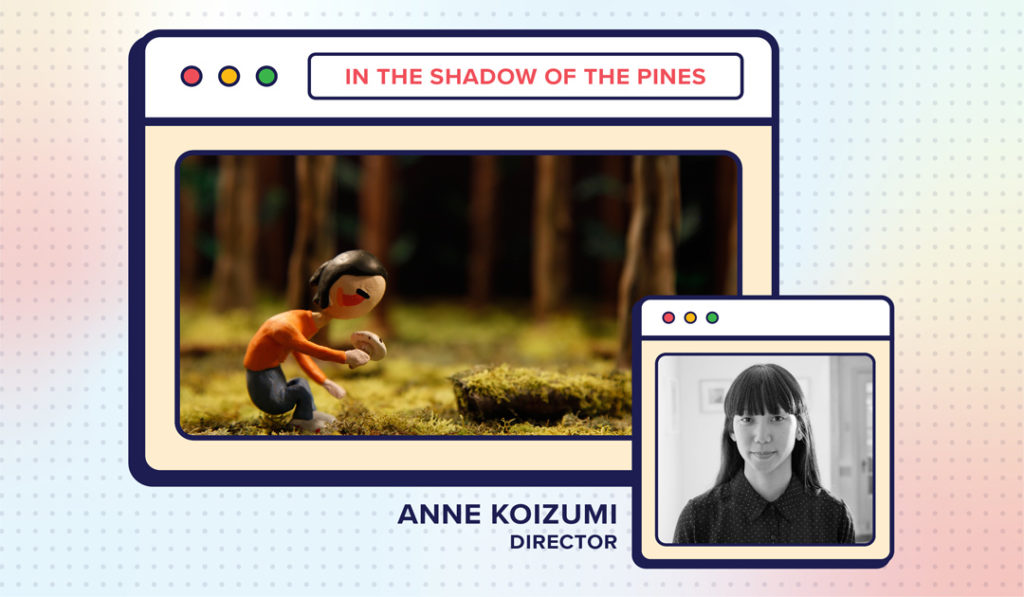
In The Shadow of the Pines
Director: Anne Koizumi
Without spoiling anything, describe your film in 7 words or less.
A. Koizumi: Childhood shame of having a working class immigrant father
Do you have a favorite memory from making this film? Were there any challenges that you had to overcome?
A. Koizumi: Making the sets and props was probably one of my favourite memories of making this film. I think that had a lot to do with the fact that I was re-creating actual objects from my childhood memories in miniature form. That process was challenging and cathartic for me because it allowed me to grieve for my father and also my lost identity.
What do you hope to see in the future for the film industry? How do you see yourself and your work playing a role in this future?
A. Koizumi: I hope for a more diverse representation in film. More BIPOC filmmakers and filmmakers from marginalized communities. Film is such an expensive medium to work in and it’s expensive to go to film and animation school.It’s hard to find funding to make film which makes it so much more inaccessible to those who don’t have money or networks which then leads to stories about marginalized communities being made by those outside of those communities. We just need to be asking who’s telling this story? I want to see more films made by working class people especially if they’re about working class people.
What’s next for you?
A. Koizumi: I would love to make another short animated film about my mother who was a huge fan of former NHL defenseman, Paul Coffey. But this is just a seed right now and I’m not sure how much my mom wants to participate in a doc. I’m interested in the relationship between sports and immigration.
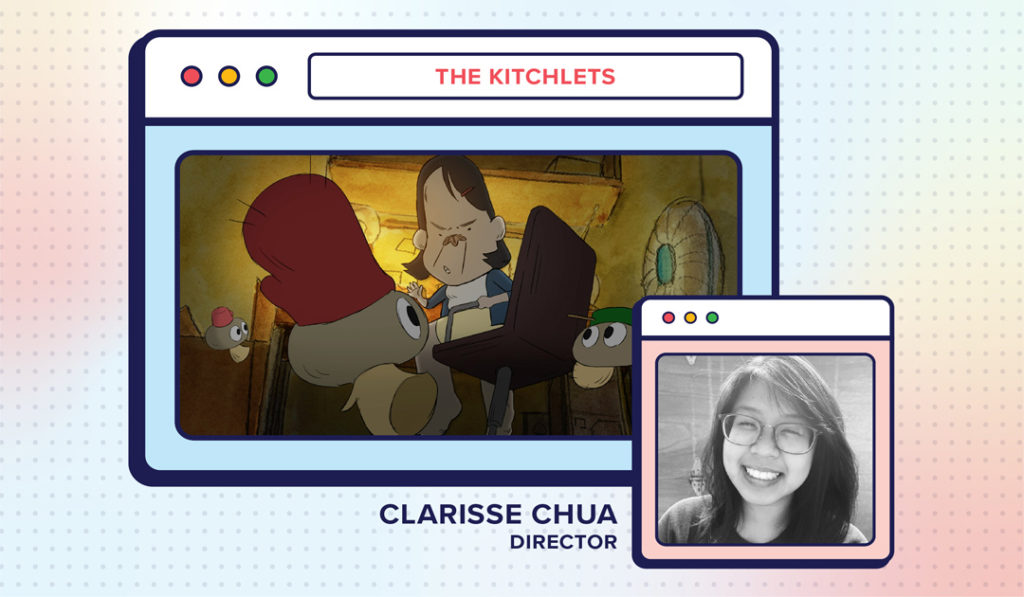
The Kitchlets
Director: Clarisse Chua
Without spoiling anything, describe your film in 7 words or less.
C. Chua: Lonely old lady and three tiny guys.
Do you have a favorite memory from making this film? Were there any challenges that you had to overcome?
C. Chua: My favourite memory would be figuring out what the Kitchlets sound like. I made a few popping noises and increased the pitch by a bit and voila! It was a fun moment to finally see and hear the Kitchlets. Friends would stare at me croaking and popping in the corner when I recorded scratch sounds for the film.
This was the first time I was making a 7min long film. In the past, I was able to create my films on my own but this year I got help from some friends at school. When the pandemic hit everyone was not allowed at school and I thought it was going to be impossible to communicate with my friends. Fortunately, they were all so communicative online and so talented. I was lucky to have them.
What do you hope to see in the future for the film industry? How do you see yourself and your work playing a role in this future?
C. Chua: I hope to see commercial animation grow into more of a filmmaking medium and not remain stagnant in the comedy or musical genre. Animation is a great tool that expands the possibilities of visual storytelling. We have already seen its potential through Wes Anderson, Quentin Tarantino’s Kill Bill, Japanese Anime, works from Cartoon Saloon and Netflix seems to be making strides in this direction as well. Animation is more than slapstick comedy for children, but it can be pushed to tell important universal characters and worlds for an international audience. Animation is not just for kids, it’s for everyone. I hope to be part of the era that allows and pushes animation to new heights!
What’s next for you?
C. Chua: I currently work at Skydance Animation Studios as a story artist. On the side, I am dabbling with a few short films and feature ideas! I am excited to get my projects fleshed out.
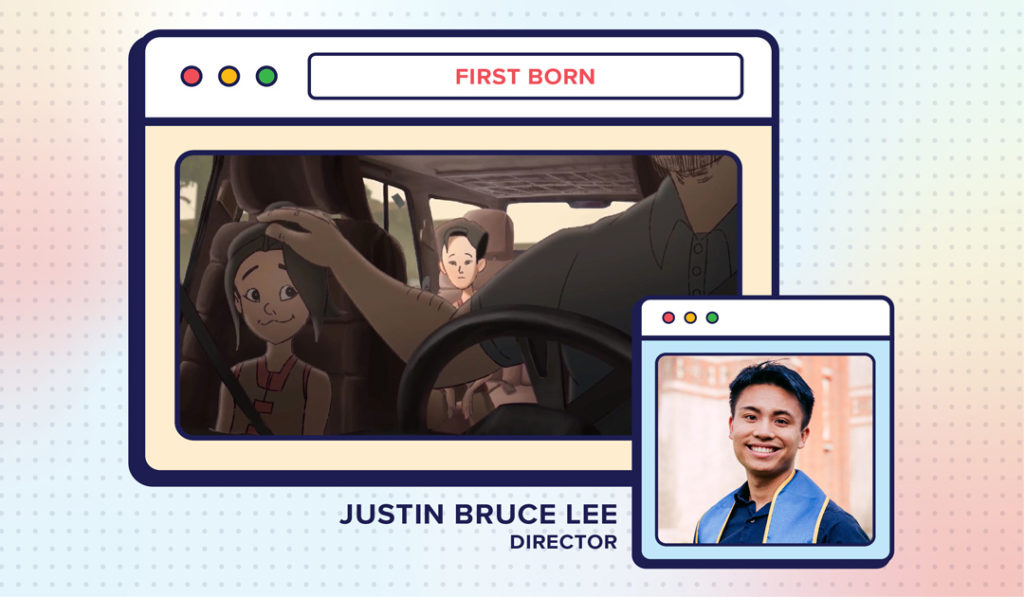
First Born
Director: Justin Bruce Lee
Producer: David Diba
Writers: Aerik Bertulfo and Arnie Sainz Co
Without spoiling anything, describe your film in 7 words or less.
J. Lee: A boy proving his own worth.
A. Sainz: Two siblings transcend inner pressures together.
Do you have a favorite memory from making this film? Were there any challenges that you had to overcome?
J. Lee: My favorite memory from making this film was seeing the final cut of First Born with the team. It’s so gratifying to see all of our hard work come together at the end. We were almost crying of happiness when we finished or we were just really exhausted haha. The challenges of making this animated short film were the deadlines. We had a short amount of time to finish at the level we want for the film. With all the long hours and late nights, we were able to pull it off and I’m so proud of our team.
D. Diba: Creating this film had many challenges, but maybe one of the biggest hurdles to overcome, was figuring out what the special effects would look like. We were all sitting at our desk at 3 o clock in the morning and I spontaneously tried an idea in after effects and it was one of those magical moments of “Eureka”. It was not the plan at all but when we all saw the shot for the first time it was like a light bulb clicked and we all got extremely excited to see our film coming together.
A. Bertulfo: As the Animation Supervisor, it was always super fun to animate the kung fu sequences as well as some of the special effects. But I will admit that one of my favorite moments during the making of this film was the progression for the score. Every so often we’d meet with our composer to go over the music, with each iteration becoming closer and closer to what we wanted. When COVID hit and we were all self-quarantined to different homes, it did become somewhat difficult to coordinate review on work and approval on shots. When we were all under one roof, we could look over each other’s shoulders and see our progress firsthand. We eventually worked out a new system, but it was definitely a harrowing challenge that arose mid-production.
A. Sainz: As the score composer, I loved working side-by-side with my directors to develop this story. A huge challenge for me was putting together a live-recorded score during the early part of the pandemic.
What do you hope to see in the future for the film industry? How do you see yourself and your work playing a role in this future?
J. Lee: I hope to see the ongoing increase of diversity and equal representation for everyone in the film industry. The ultimate goal is to reach for a time where no one sees race anymore and just see everyone as equal human beings. Bruce Lee said, ” Under the sky, under the heavens, we are just one family.” In the future, when I have the opportunity to work on another project, I want to keep having equal representation in my stories that anyone from any community can relate to.
D. Diba: I hope to see more experimentation in feature film animation style. I was really blown away with the creation of Into the Spider-verse iIn how they developed new ways of combining 2D and 3D animation. I hope to continue that trend in creating unique and different looks in film
A. Bertulfo: One thing I hope for the future of the film industry is more diversity and representation amongst the different Asian communities, whether it be live-action or animated. I believe my main profession as an Animator can help tell stories and portray characters in a manner similar to what we’ve done for “First Born”.
A. Sainz: As a composer, I hope to hear more cutting edge film scores that adapt to the sounds and technology of the future while also keeping a grounded human element through live recordings, ensembles, and collaboration.
What’s next for you?
J. Lee: I am currently working for Lucasfilm Animation as an associate storyboard artist.
D. Diba: Currently, I’m a background designer on Disney Jr’s Puppy Dog Pals, which I’m having a blast doing. I’m learning a lot! However my eventual goal is to work in Feature Animation and to continue making short films with my friends.
A. Bertulfo: Right now I’m working at a company as a Junior Animator. In the future, I hope to work for notable studios like Disney, Pixar, and DreamWorks.
A. Sainz: I’m hoping to re enroll to grad school at NYU for Jazz Composition and Film Scoring.
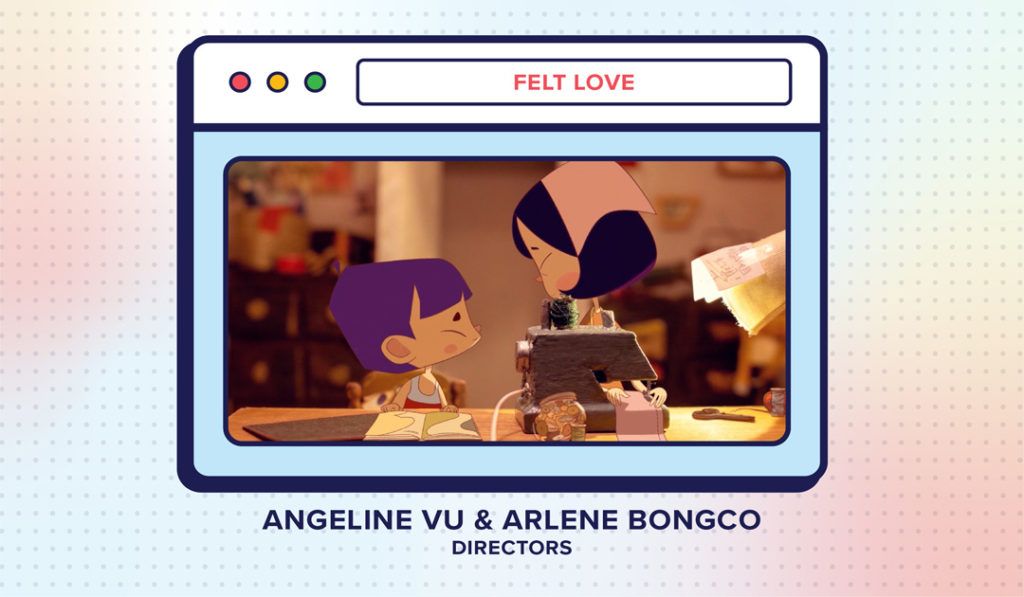
Felt Love
Director: Angeline Vu & Arlene Bongco
Without spoiling anything, describe your film in 7 words or less.
A. Vu: Time with family.
A. Bongco: Heartwarming familial love
Do you have a favorite memory from making this film? Were there any challenges that you had to overcome?
A. Vu: My favorite memory was building the physical set we used for our backgrounds. It was tough at first because we had to figure out how to make everything to scale, as well as figure out how to actually make tiny props like tables and chairs, but it was ultimately very fulfilling to see all our hard work come together to create the finished set.
A. Bongco: Making the set was probably one of the most fun parts of making this film! We spent about two weeks having fun with different materials and learning new things. The hardest part about the film was making the story! It took about eight months to plan and revise it to a point where we were really happy with it.
What do you hope to see in the future for the film industry? How do you see yourself and your work playing a role in this future?
A. Vu: I would like to see more unique art styles and techniques being used in film. I hope to be able to work on projects that push the boundaries of film and explore the medium.
A. Bongco: I hope to see more diverse representation of cast members in Hollywood and also less stereotyping of different cultures. Eg: All South Asians don’t look like Apu from the Simpsons. Also, with Covid-19, I am hoping we will be able to do more remote collaborations.
What’s next for you?
A. Vu: I hope to explore different paths within the animation industry and to work with many different inspiring and talented people!
A. Bongco: I am acting in a short film in the Bay Area which is being directed by a director remotely from LA. Also working on a play where the director is remotely directing from India. Looking forward to your festival.

Felt Love
Director: Angeline Vu & Arlene Bongco
Without spoiling anything, describe your film in 7 words or less.
A. Yau: All the moments I was on stage.
Do you have a favorite memory from making this film? Were there any challenges that you had to overcome?
A. Yau: Looking at my script at 3 am and thinking, I have one more page to film but I think I am done. Challenge of knowing to trust your instinct and shape your story as you go and not to stick to the exact original plan.
What do you hope to see in the future for the film industry? How do you see yourself and your work playing a role in this future?
A. Yau: I really do hope we see more Asian American stories in the industry, not just in front of the camera but behind the camera. Often times our stories get overlooked or become cliches, we are much more than children of immigrants, battling between two identities and being the model minority. We can be leads, we can tell a story without addressing our background explicitly.
What’s next for you?
A. Yau: I am hoping to create a long form series with my stop-motions as I create more! Addressing more issues and themes Asian Americans face in their childhoods.
To watch this short film program, Small Moments, you can purchase access here. This program is available from November 5th – 15th.
Watch the recorded Q&A here, conducted on 11/8 at 12:30pm EST over livestream with the featured filmmakers of this program.

